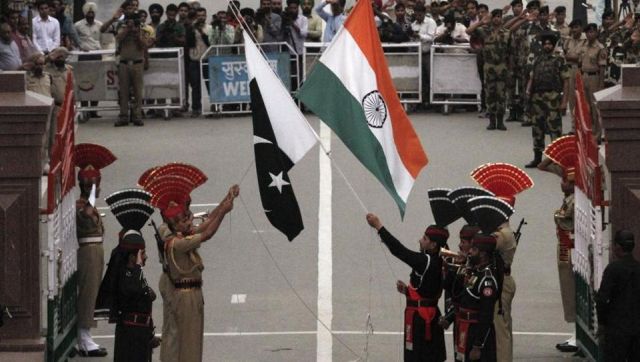
by Editor | May 25, 2021 | News, Politics
 By Arul Louis,
By Arul Louis,
United Nations : Cross-border terrorism from Pakistan is at the root of the current situation in Kashmir and it has also victimised the people of the part of the state occupied by Pakistan, India said on Tuesday dismissing Islamabad’s attempts to raise the Kashmir issue at the UN Human Rights Council (UNHRC) meeting in Geneva.
“Jammu and Kashmir is an integral and inseparable part of India and will always remain so” despite Pakistan’s use of “terrorism as a state policy” for territorial aquisition, Sumit Seth, a First Secretary in India’s UN Mission in Geneva, said on Tuesday while exercising the right of reply to Pakistan’s allegations about India.
“The present situation in the Indian State of Jammu and Kashmir is the direct result of sustained cross-border terrorism emanating from Pakistan,” he said.
“The high number of casualties sustained by Indian security forces is a reflection of the tremendous amount of restraint displayed by them under these difficult circumstances.”
Pakistan’s Permanent Representative in Geneva, Farukh Amil, raked up the Kashmir issue while taking exception to UN Human Right Commissioner Zeid Ra’ad al-Hussein criticising India and Pakistan on Monday for not allowing a fact-finding team to the Indian state and the part occupied by Pakistan.
Amil asserted that reports of atrocities and human rights abuses emanated from the Indian state and not from the part of it occupied by his country and, therefore, questioned al-Hussein equating the two countries.
Amil alleged that al-Hussein’s statement was not based on facts.
Seth in his rejoinder said that India had “a robust institutional framework to ensure adherence to the rule of law and respect for fundamental rights of the people in Kashmir” built on an independent judiciary, the National Human Rights Commission, vibrant civil society and free and vocal media.
The people of the Indian state have regularly exercised their democratic rights, Seth added.
“In contrast, the people of Pakistan as well as Pakistan Occupied Kashmir have become victims of sectarian conflict, terrorism and severe economic hardship due to Pakistan’s authoritarian and discriminatory policies in complete disregard of human rights,” Seth said.
When the floor was opened at the council meeting on Tuesday to NGOs and civil society organisations, a motley group of them let loose a volley of propaganda against India.
According to a summary of the proceedings prepared by the HRC, some of these centred on India and Pakistan not allowing a fact-finding mission to the Indian state and the Pakistan-occupied portion of it, while others singled out India.
The Association for the Protection of Women and Children’s Rights said there was a need to focus on the situation in territories under foreign occupation and lumping Kashmir in that category it asserted that human rights violations had increased there because the HRC mission was not allowed in.
Commission Africaine des Promoteurs de la Sante et des Droits de l’Homme said that terrorism and systematic human rights violations in Kashmir required more attention by the High Commissioner and that unprovoked heavy shelling had resulted in daily deaths of civilians.
A group called Liberation alleged that India was experiencing increasing religious intolerance under the pretext of the protection of the “holy cow”.
Indigenous People of Africa Coordinating Committee claimed that homes of non-Hindu minorities had been systematically destroyed and their products were regularly boycotted.
Centre for Organisation Research and Education said that members of scheduled tribes and castes were victims of rape and honour killings.
A group called Tamil Uzhagam said that human rights activists in Tamil Nadu needed the UNHRC’s protection.
(Arul Louis can be reached at arul.l@ians.in)
—IANS
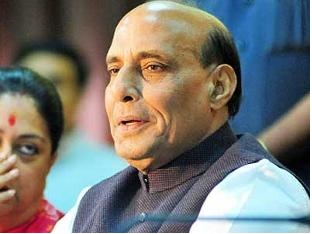
by Editor | May 25, 2021 | News, Politics
 By Sheikh Qayoom,
By Sheikh Qayoom,
Srinagar/Jammu : Union Home Minister Rajnath Singh on Monday sought to address the concerns over the legal challenge to the Constitution’s Article 35A by stating that the Narendra Modi government would do nothing that would go against the aspirations of Kashmiri people while also asserting that he was ready to come here and meet anyone to bring peace to the state.
Concluding his two-day visit to the Kashmir Valley on Monday, he also said that the situation here was improving and he could see “the green buds of peace on the trees”.
Addressing the media before leaving on two-day visit to Jammu, he said the controversy round article 35A was a non-issue that was being unfortunately raked up.
“The centre will do nothing that would go against the wishes and aspirations of the Kashmiri people regarding article 35A.
“I feel there is no reason for doubt and confusion on this issue. The centre has not gone to the court in this regard and I want to assure that whatever our government will do, it will not go against the wishes and aspirations of the people,” he said.
Asked about the divergent positions taken by the RSS and even the BJP leaders and ministers who were demanding the abrogation of the article that gives special privileges to the permanent residents of J&K, an assertive Rajnath Singh said: “I am a BJP leader and the Home Minister of the country. My statement on this issue should be taken as final.”
Chief Minister Mehbooba Mufti and her predecessor Omar Abdullah both welcomed the assurance, but the latter also sought that the central government should now translate the assurance on ground by filing a counter affidavit in the Supreme Court.
Rajnath Singh, meanwhile asked about starting a political initiative in the state, said: “I have never counted the number of times I came here. I have always come with an open mind, but people must come forward to talk.”
Asked about the arrests of separatist leaders in the state, he said the National Investigation Agency is acting according to the law of the land, but added that this should not deter those who want to talk to the government.
“Law will take its course, but we are ready to speak to everybody. We have never opposed talks. The all party delegation came here and met everybody, we did not oppose that. I have already said that all stakeholders are welcome and anybody ready to talk to us is welcome,” he asserted.
He also said that during his present trip, he was convinced that things were improving in the Valley.
“What I have seen during last two, three days has convinced me that the trees of peace have not dried up. I can see green buds of peace on these trees.
“I have not counted how many times I have come here. If I have to come 50 times to bring peace to J&K, I will do that,” he asserted.
Singh said he met 55 delegations during this visit and was always ready to meet anyone without reservations.
“I have met non-political people including students, teachers, things are improving with every passing day. The situation may not have improved completely, but it is improving. I don’t want to leave out anyone with whom dialogue is possible,” he added.
He said he was moved to tears while paying tributes to slain policemen in south Kashmir.
“While giving tributes to Kashmir policemen, the face of ASI Abdul Rashid’s daughter, Zohra was passing through my mind. We want every face in Kashmir to smile,” he said.
He said the issue of disturbed area allowance to state policemen on the pattern of central armed forces was being considered.
On the developmental front, he said: “I have reviewed the progress on the implementation of Prime Minister’s developmental package for the state. From the initially slotted Rs 85,000 crore, it will now cross Rs 100,000 crore.”
The minister also said that children must have been pushed by motivators to commit crimes and they should not be treated as criminals.
“They must be dealt under juvenile justice system and not be put into jails. They must be properly counselled. I told security forces that no excesses should be committed during operations.”
He blamed terrorists for destroyed generations of Kashmir and reaffirmed that the government will not allow another generation to be destroyed.
“Poor people and businessman, youth with positive attitude and tourism industry have immensely suffered. After a wrong message went out, tourists stopped coming here. I want to send them a message that the people of Kashmir are ready to receive you, there is no danger here,” he said.
On the use of pellet gun, he said they had introduced the PAVA gun to replace it but he had been told that it is not very effective. However, he added that in comparison to past, less people have been injured during crowd control in the Valley during the past months.
He denied any political party delegations had sought revocation of the stringent AFSPA during their meetings with him.
Rajnath Singh held later a rally in Naushera in Jammu region where he said India wanted peace with Pakistan, but will respond to its ceasefire violations sternly. He also met residents of border villages who have migrated to safer places due to the ceasefire violations by the Pakistani troops.
In Jammu city, various delegations called on him.
—IANS
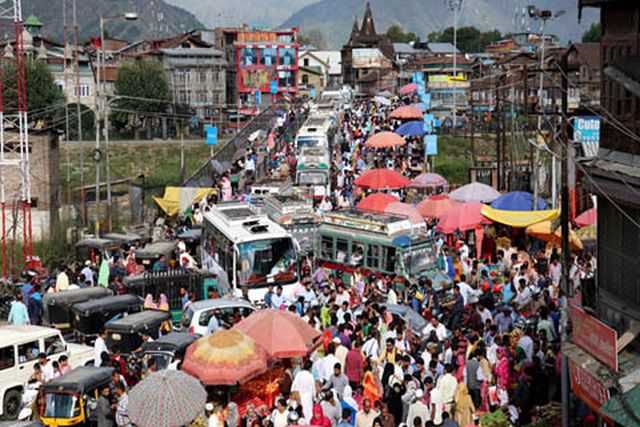
by Editor | May 25, 2021 | Economy, Markets, News
 By Sheikh Qayoom,
By Sheikh Qayoom,
Srinagar : Markets in Srinagar and other towns in the Kashmir Valley wore a festive look on Friday as Eid shopping reached a high pitch with bakers, sacrificial animal sellers and hosiery shops doing brisk business.
Makeshift bakery shops, pavement vendors and hawkers carting their goods have choked all the major roads in Srinagar as traffic policemen threw up their hands surrendering to the merriment of buyers and sellers.
Prices were nobody’s bother and it looked as if the various regulatory authorities had decided not to play spoilsport while Eid shoppers emptied their purses to the demands of the shopkeepers.
Officials of the consumer affairs and public distribution department, however, asserted that market checking squads were out to control prices, but because of staff shortages they were not very conspicuous.
Sacrificial animal markets have come up at every imaginable space in the city wherever a herd of sheep and goats can be parked.
The traditional Eidgah grounds in the old city area where the Valley’s biggest sacrificial animal market used to come up on Friday looked like just another place where sheep and goats could be bought.
Prices of sacrificial sheep and goats depended on the wishes of the sellers and the paying capacity of the buyers.
A well-fed sheep with curved horns was declined by one buyer at Rs 17,000. Within minutes, another eager buyer paid Rs 18,000 for the same animal.
Children mostly bought toys and firecrackers. They also showed their newfound interest in mobile phones and electronic goods.
“My son Fouzan wants an electronic toy called the spinner. Its cost varies between Rs 500 and Rs 10,000. It is now his choice which one he chooses. I have decided to curtail other expenses to fulfil his desire,” said Zahoor Ahmad, a government official.
While men were busy buying sacrificial animals, bakery, poultry and other edibles for the festival, women mostly engaged in buying hosiery items.
The busiest market as usual was the city centre Lal Chowk and the Residency Road area in uptown Srinagar. While shops were thronged by buyers, pavement sellers had taken over all the pedestrian malls and even encroached on the roads.
Traffic jams were seen on Thursday evening and Friday in busy markets in Srinagar.
Sacrificial animals are mostly not weighed on a balance. More than the weight of the animal, it is generally the appearance which fetches a good buyer.
Muslims offer animal sacrifice on Eid-ul-Azha to commemorate the tradition created by Prophet Abrahim who decided to sacrifice his son Ismail on Allah’s command. Seconds before the father’s knife would silt the son’s throat, Allah ordered a sheep to replace Ismail.
There was jubilation in Abrahim’s family as Allah had accepted the sacrifice and also saved Ismail. The joy of that occasion is celebrated by devout Muslims as Eid-ul-Azha.
Eid prayers would be offered throughout the Valley on Saturday morning. Authorities have said no Eid prayers would be allowed on Saturday at the Tourist Reception Centre grounds here.
—IANS
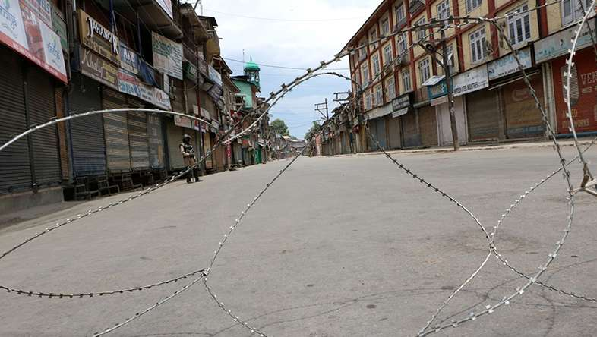
by Editor | May 25, 2021 | News, Politics
 Srinagar (IANS): Strict curfew continued for the 10th day on Sunday in the Kashmir Valley, police said.
Srinagar (IANS): Strict curfew continued for the 10th day on Sunday in the Kashmir Valley, police said.
“Curfew shall continue in all the ten districts of the Valley,” a senior police official said.
“Security forces have been instructed to allow movement of patients along with their attendants.”
“People going to the airport will not face any hardship as air tickets were being treated as curfew passes,” the official added.
The death toll in the ongoing violence reached 41 after an unruly mob torched a police picket in north Kashmir’s Kupwara district on Saturday. Police opened fire at the mob resulting in the death of a youth.
All vernacular and English dailies suspended publication for the second day on Sunday.
State government officials said newspaper owners were asked to suspend publications till July 19.
Cable television operations were allowed on Saturday evening after remaining suspended for a day.
The resumption of cable television operations was allowed after the operators agreed to take off all Pakistani TV channels and two private Indian channels.
Mobile phone internet and call operations remained suspended in south Kashmir areas for the eighth day while the same remained suspended for the second day in central and north Kashmir areas on Sunday.
Mobile phone operations without any internet facility are, however, continuing on post paid mobile phones provided by the Bharat Sanchar Nigam Limited (BSNL).
Train services between north Kashmir Baramulla and Bannihal town in the Jammu region also remained suspended.
All recruitment interviews scheduled for the next four days have been cancelled by the state public service commission (PSC).
All schools, colleges and universities in the Valley were also shut down.
Senior separatist leaders including Syed Ali Geelani, Mirwaiz Umer Farooq, Muhammad Yasin Malik, Shabir Ahmad Shah and others have been either placed under house arrest or taken into preventive custody to restrain them from participating in protests.
Separatists have appealed the people to continue the shutdown till Monday.
The shutdown in the Valley started on July 9 following the death of Hizbul Mujahideen commander, Burhan Wani in a gunfight with the security forces on July 8.
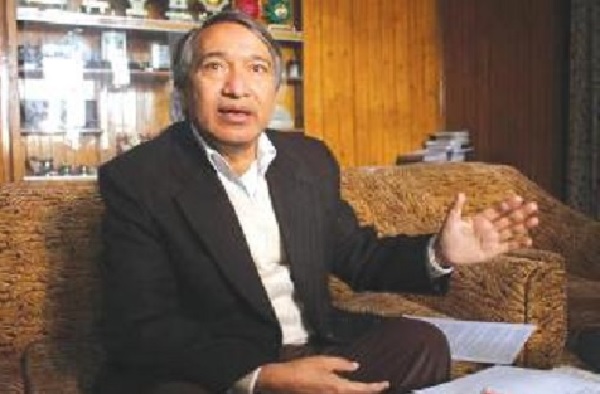
by Editor | May 25, 2021 | Interviews

Mohammed Yousuf Tarigami
Jammu and Kashmir needs a coalition of regional parties to keep out the BJP, the CPI-M’s lone legislator in the state says, however adding that he doesn’t expect this to happen anytime soon.
Mohammed Yousuf Tarigami said his party always knew that the Peoples Democratic Party (PDP)-Bharatiya Janata Party (BJP) coalition was “an alliance of opportunists”. “Their so-called ‘Agenda of Alliance’ or ‘common minimum programme’ was merely a façade to gain power,” Tarigami told IANS over the telephone amid continuing political impasse in the state.
“Now, after (Chief Minister Mufti Mohammed) Sayeed’s demise, they are finding it difficult to re-enforce the alliance as the PDP-BJP combine has no common ground to rule, their agenda is ambiguous,” said the long-time legislator from Kulgam in south Kashmir.
Ever since her father Mufti Sayeed died in early January, Jammu and Kashmir has been under Governor’s Rule because PDP chief Mehbooba Mufti has refused to form a government with the BJP.
Speculation has it that the PDP and the BJP marriage has run into rough weather — although no one says it in so many words. Opposition parties in the state, however, feel the two are indulging in a political drama.
The National Conference, the PDP’s main foe in the Kashmir Valley, wants fresh elections. Tarigama disagrees.
“There is no need for fresh elections and waste taxpayers’ money. The state leaders should set aside their minor differences and come together to form a strong government,” he said. “They should look at the larger picture of the defeating divisive BJP-RSS policy in Kashmir.”
The PDP and the BJP are the largest and second largest parties in splintered Jammu and Kashmir assembly. The National Conference and the Congress are in the third and fourth spots.
“If you look at it, they claimed to have come together to bridge the gap between the three regions of the state. They clearly failed to do that. Or else there wouldn’t be a problem today to re-enforce the alliance.”
Would the CPI-M, with just one member in the 87-seat assembly, support an alliance minus the BJP?
“Yes, but as of now no such thing seems likely to happen,” he said.
“However, if the PDP decides to sever ties with BJP, regional parties can and definitely should come together for the greater good and form a secular and strong government in the state.”
He said the Communist Party of India-Marxist would any day support a government that respects people’s mandate and does not hurt the sentiments of any community.
Tarigami said Governor’s Rule was no answer to Jammu and Kashmir’s problems.
“Governors Rule means Centre’s rule, in other words BJP’s rule.
“The state has witnessed an unprecedented rise in incidents of communally driven violence (with the BJP pulling the strings). Jammu and Kashmir has no future with the BJP (in power).
“Babus cannot address the immediate concerns of the people. They (people) feel disconnected from the state machinery now,” the veteran politician added.
Tarigami argued that he was sure the PDP and the BJP would finally shake hands to again rule the country’s only Muslim-majority state.
“It won’t be surprising for me that the PDP-BJP will form a government. These two parties have always played with people’s sentiments. Their only aim is to gain power at any cost.
“I’m certain they will work out their so-called differences in the coming days to form a new government.”
(Shamshad Ali can be contacted at shamshad.a@ians.in)





